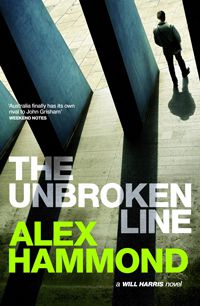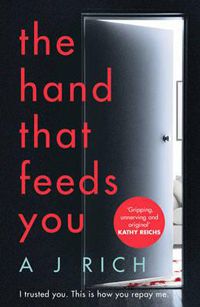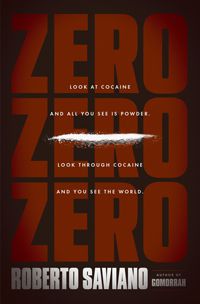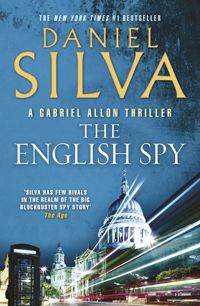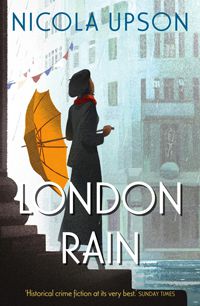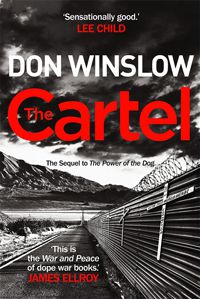The Unbroken Line by Alex Hammond
Defence lawyer Will Harris has barely recovered from being hospitalised after going rogue in his first book, Blood Witness, when he and his lover Eva are attacked and threatened by strangers who tell him to back off. Will, who doesn’t enjoy danger as much as it enjoys him, would oblige if only he knew what he was supposed to back off from. He’s already busy fighting a complaint accusing him of some suspicious activity (of which he’s not entirely innocent) and grappling with his newly minted law firm, a business partner who is never around, and defence cases he’d prefer to avoid. Now, of course, he’s got something else on his plate – finding out who assaulted them and caused Eva to flee from Will and the violence that surrounds him.
If you’ve ever wondered how it feels to be a defence lawyer, read this and wonder no longer: if it’s half as complicated and tense as this book, we should all just stick to being armchair lawyers, even if the pay isn’t as good. Will’s exhausting day-to-day life of interviews and solving murky problems into crystal-clear defences and juggling any kind of private life is something else – and obviously fictionalised enough to be interesting (Will is a media darling following his adventures in the Ned Kelly Prize-shortlisted Blood Witness, after all), while retaining memory of enough paperwork out of the ears to be realistic, if not slightly depressing for trees.
This is one for Readings locals – as Will gallivants around town from east to west and north to south, getting into crashes in the Burnley Tunnel and going for drinks in bars as familiar as the one you were in just last weekend, it’s a heady tale of local intrigue that spans contemporary Melbourne and a grim part of Australia’s history.
I often take notes on my phone when I’m reading, to help me remember good lines (or make up my own! Like this one just now.) I wrote ‘moral quandary’ on its own, because the idea infuses every page of the book. Will is a serious man who tries to do good in a career and a world that seems desperate to stop him. And he’s not some shining white knight, here to save everyone from his ethically stabled high horse – he twists himself in knots that can’t be untangled without assistance. The legal world is one soaked in privilege, with all the good and evil that come with it, and Will, with his family ties to the industry, is part of the problem. Can he overcome this to prove himself, and which lines will he refuse to cross?
The Hand That Feeds You by A.J. Rich
I’m never sure about the idea of two authors collaborating to write – surely, there would just be constant fighting about where to put commas? – but from the first few pages of this book I was immediately compelled: together Amy Hempel and Jill Ciment create a personal, immersive writing style that feels akin to travelling alongside a character as they work out what is happening, instead of watching them, popcorn-in-hand, while they blast through the world hurling wisecracks (which, don’t get me wrong, is also an excellent literary choice).
Even as protagonist Morgan Prager – student of victimology, soft touch when it comes to sad-looking dogs, and newly minted fiancée – comes home to find Bennett, the man she loves, mauled to death by her three beloved pets, it’s a gruesome scene that breaks your heart rather than makes you cover your eyes. And when she recovers from that discovery enough to leave the hospital she’s been put in to try and find his parents and break the news to them, Morgan cannot find them. They do not exist, and neither does Bennett, apparently: no one by that name had his job or lived his life where he told her. Now feeling dejected as well as guilty, Morgan’s investigation into Bennett’s deception leads her to others he has targeted – and the realisation that not everyone survived his ruse.
Following Morgan as she pulls at the threads of their life together is an unsettling experience, raising questions about the notion of responsibility, and how you expect those around you to respond when your pets savage another person. It’s also unnerving that as a reader you find yourself with a surprising desire to see some big ol’ gentle puppies saved from certain execution by a savvy lawyer even after you find out – in detail – what they did to Bennett.
It’s a chilling skill these authors have: using the most attractive of writing to hide the most unpleasant of scenes.
Zero Zero Zero by Roberto Saviano
After the publication of his first book, Gomorrah – which led to him being granted a permanent police escort after being threatened by more than one godfather-type – in Zero Zero Zero, Saviano sniffs around in the cocaine trade and outlines his view that the drug is so prevalent that its distribution drives the modern economy. Saviano speaks to informers, addicts, kingpins, travelling and writing expansively, researching further than the countries traditionally accused of keeping a powdered finger in the pie.
The English Spy by Daniel Silva
Silva’s art restorer-slash-spy-slash-assassin (aren’t we all such multi-taskers?) Gabriel Allon is one of the most beloved spies in modern crime fiction – a man who many love to follow as he travels the world to bring justice and vengeance to those who need it. In The English Spy, Allon is on the hunt for elusive bomb-maker Eamon Quinn, a man whose grim skills Allon suspects have just despatched one the most famous women in the world – the ex-daughter-in-law of the Queen of England. And, as happens when you’re a successful assassin, when you’re on the hunt for someone, there are others on the hunt for you.
London Rain by Nicola Upson
During the coronation of King George – no, not the adorable toddler – in 1936, crime author Josephine Tey is in glittering London for the production of one of her radio plays. All is going delightfully until BBC broadcasting favourite Albert Beresford is killed, and then so is his mistress, who is also the lead in Tey’s play. All seems horribly but swiftly cut-and-dried with an obvious suspect, but Tey has her own suspicions that the deaths have more of a thread in the murky past than anyone wants to believe. Perfectly set in its time, Upson’s seventh Josephine Tey novel is a cleverly crafted psychological tale.
The Cartel by Don Winslow
This glorious, hefty tome, sequel to Winslow’s legendary organised crime epic The Power of the Dog, has been years in the making and it shows. It is well-researched, gritty, violent and, presumably, printed with adrenaline in the ink because this story follows one hell of a pursuit. Art Keller is a DEA agent who destroyed his own life, and that of many others, to get cartel boss Adan Barrera behind bars. But Barrera’s connections and wealth mean that prison is not quite like it is for the rest of us (locked up for stealing time to read more books) – and when he inevitably escapes and puts a two-million-dollar bounty on Keller’s head, a bloodthirsty, decade-long hunt ensues.


